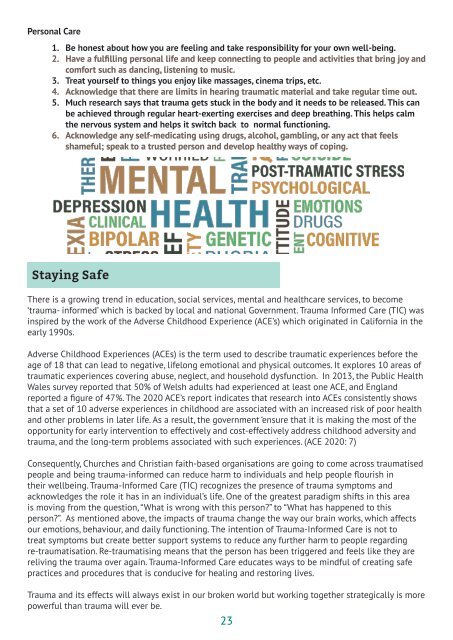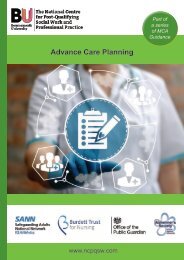Burnout in Churches and Christian Faith-Based Organisations
Burnout is a “syndrome of emotional exhaustion, depersonalization and reduced personal accomplishment that can occur among individuals who work with people in some capacity (Maslach 1996:193). This definition, whilst helpful, fails to convey the potentially life-shattering impact that burnout can have, as described in the words of ‘Peter’, a Christian leader who contributed to this guidance.
Burnout is a “syndrome of emotional exhaustion, depersonalization and reduced personal accomplishment that can occur among individuals who work with people in some capacity (Maslach 1996:193).
This definition, whilst helpful, fails to convey the potentially life-shattering impact that burnout can have, as described in the words of ‘Peter’, a Christian leader who contributed to this guidance.
You also want an ePaper? Increase the reach of your titles
YUMPU automatically turns print PDFs into web optimized ePapers that Google loves.
Personal Care<br />
1. Be honest about how you are feel<strong>in</strong>g <strong>and</strong> take responsibility for your own well-be<strong>in</strong>g.<br />
2. Have a fulfill<strong>in</strong>g personal life <strong>and</strong> keep connect<strong>in</strong>g to people <strong>and</strong> activities that br<strong>in</strong>g joy <strong>and</strong><br />
comfort such as danc<strong>in</strong>g, listen<strong>in</strong>g to music.<br />
3. Treat yourself to th<strong>in</strong>gs you enjoy like massages, c<strong>in</strong>ema trips, etc.<br />
4. Acknowledge that there are limits <strong>in</strong> hear<strong>in</strong>g traumatic material <strong>and</strong> take regular time out.<br />
5. Much research says that trauma gets stuck <strong>in</strong> the body <strong>and</strong> it needs to be released. This can<br />
be achieved through regular heart-exert<strong>in</strong>g exercises <strong>and</strong> deep breath<strong>in</strong>g. This helps calm<br />
the nervous system <strong>and</strong> helps it switch back to normal function<strong>in</strong>g.<br />
6. Acknowledge any self-medicat<strong>in</strong>g us<strong>in</strong>g drugs, alcohol, gambl<strong>in</strong>g, or any act that feels<br />
shameful; speak to a trusted person <strong>and</strong> develop healthy ways of cop<strong>in</strong>g.<br />
Stay<strong>in</strong>g Safe<br />
There is a grow<strong>in</strong>g trend <strong>in</strong> education, social services, mental <strong>and</strong> healthcare services, to become<br />
‘trauma- <strong>in</strong>formed’ which is backed by local <strong>and</strong> national Government. Trauma Informed Care (TIC) was<br />
<strong>in</strong>spired by the work of the Adverse Childhood Experience (ACE’s) which orig<strong>in</strong>ated <strong>in</strong> California <strong>in</strong> the<br />
early 1990s.<br />
Adverse Childhood Experiences (ACEs) is the term used to describe traumatic experiences before the<br />
age of 18 that can lead to negative, lifelong emotional <strong>and</strong> physical outcomes. It explores 10 areas of<br />
traumatic experiences cover<strong>in</strong>g abuse, neglect, <strong>and</strong> household dysfunction. In 2013, the Public Health<br />
Wales survey reported that 50% of Welsh adults had experienced at least one ACE, <strong>and</strong> Engl<strong>and</strong><br />
reported a figure of 47%. The 2020 ACE’s report <strong>in</strong>dicates that research <strong>in</strong>to ACEs consistently shows<br />
that a set of 10 adverse experiences <strong>in</strong> childhood are associated with an <strong>in</strong>creased risk of poor health<br />
<strong>and</strong> other problems <strong>in</strong> later life. As a result, the government ‘ensure that it is mak<strong>in</strong>g the most of the<br />
opportunity for early <strong>in</strong>tervention to effectively <strong>and</strong> cost-effectively address childhood adversity <strong>and</strong><br />
trauma, <strong>and</strong> the long-term problems associated with such experiences. (ACE 2020: 7)<br />
Consequently, <strong>Churches</strong> <strong>and</strong> <strong>Christian</strong> faith-based organisations are go<strong>in</strong>g to come across traumatised<br />
people <strong>and</strong> be<strong>in</strong>g trauma-<strong>in</strong>formed can reduce harm to <strong>in</strong>dividuals <strong>and</strong> help people flourish <strong>in</strong><br />
their wellbe<strong>in</strong>g. Trauma-Informed Care (TIC) recognizes the presence of trauma symptoms <strong>and</strong><br />
acknowledges the role it has <strong>in</strong> an <strong>in</strong>dividual’s life. One of the greatest paradigm shifts <strong>in</strong> this area<br />
is mov<strong>in</strong>g from the question, “What is wrong with this person?” to “What has happened to this<br />
person?”. As mentioned above, the impacts of trauma change the way our bra<strong>in</strong> works, which affects<br />
our emotions, behaviour, <strong>and</strong> daily function<strong>in</strong>g. The <strong>in</strong>tention of Trauma-Informed Care is not to<br />
treat symptoms but create better support systems to reduce any further harm to people regard<strong>in</strong>g<br />
re-traumatisation. Re-traumatis<strong>in</strong>g means that the person has been triggered <strong>and</strong> feels like they are<br />
reliv<strong>in</strong>g the trauma over aga<strong>in</strong>. Trauma-Informed Care educates ways to be m<strong>in</strong>dful of creat<strong>in</strong>g safe<br />
practices <strong>and</strong> procedures that is conducive for heal<strong>in</strong>g <strong>and</strong> restor<strong>in</strong>g lives.<br />
Trauma <strong>and</strong> its effects will always exist <strong>in</strong> our broken world but work<strong>in</strong>g together strategically is more<br />
powerful than trauma will ever be.<br />
23



